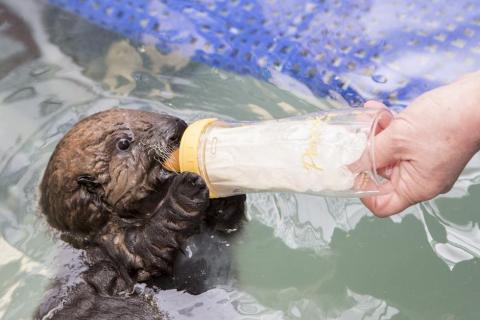
When pup 681 (later known as Luna) first arrived at Chicago’s Shedd Aquarium, she wasn’t able to use her paws to eat, and the animal care team had to hand-feed her. In November 2014, she progressed from taking small pieces of clam from a trainer’s fingers to moving food placed on her paws into her mouth. Her menu also expanded to include pieces of shrimp. Sea otters eat 25 percent of their body weight daily.
The orphaned baby sea otter was as sad and winsome as any cartoon animal Disney ever put on screen. Last October, the California Department of Fish and Wildlife and the Monterey Bay Aquarium rescued a tiny pup that appeared to be abandoned by her mother on a beach near Santa Cruz. Stranded and crying, she was thought to be less than a week old and weighed just over 2 pounds, the smallest baby otter found in years
The aquarium gave pup 681 (she was the 681st rescued in the facility’s history) intensive care for four weeks, but its Sea Otter Program does not provide long-term animal care. At the end of the month, mammal trainers and veterinarians took her to Chicago’s Shedd Aquarium, one of the few U.S. facilities with the available space and staff to care for infant otters.
In December, the Shedd staff started a naming campaign, hosting a vote online with names for the public to choose: Cali, Ellie, Luna, Poppy, Ana, Anya. Meanwhile, trainers ministered to the pup 24/7, ensuring she developed certain behaviors like grooming, foraging, feeding and even regulating her own body temperature. Harry Potter author J.K. Rowling tweeted her choice: “Luna, of course.” Luna Lovegood, after all, is a heroine at the Hogwarts school of wizardry. Like magic, the name won.
Luna appeared on lots of news outlet lists of the cutest animals of 2014. But it’s not just about cute. “Luna has captured the attention of millions of people and highlighted the plight of sea otters,” says Tim Binder, who oversees animal care and the rescue rehab program at Shedd. “She’s become a great ambassador for research and been a great ambassador for the conservation work not just for Shedd but for all zoos and aquariums.”
Luna was a rare occasion when public opinion seemed to turn, if just slightly, toward supporting a belief that many in the animal conservation world hold: that captivity, when done right, is a valuable conservation tool.
